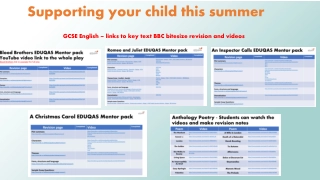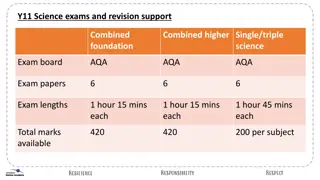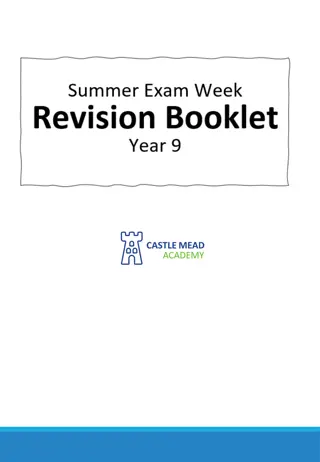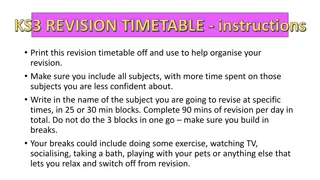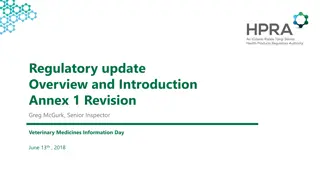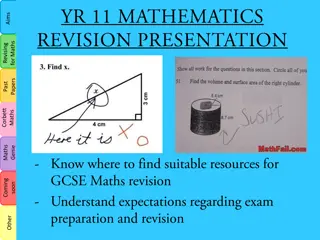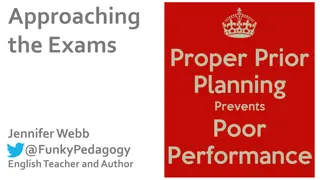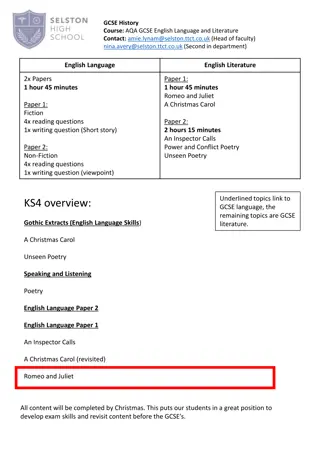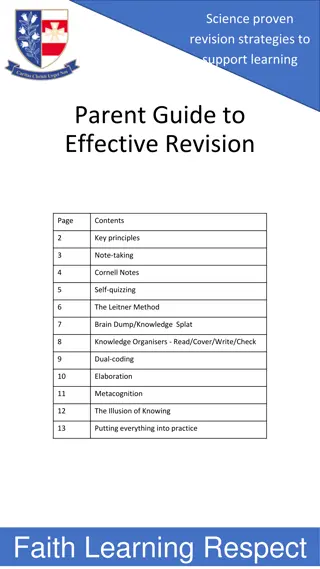Effective Revision Strategies for Year 8 English Summer Exams
Discover effective revision strategies for the Year 8 English Summer Exams, including retrieval practice, flashcards, mind maps, and persuasive writing techniques. Learn how to structure persuasive responses using AFOREST (logic/reason, credibility/trust, emotions/values) and identify key features in persuasive texts to enhance your writing skills.
Download Presentation

Please find below an Image/Link to download the presentation.
The content on the website is provided AS IS for your information and personal use only. It may not be sold, licensed, or shared on other websites without obtaining consent from the author. Download presentation by click this link. If you encounter any issues during the download, it is possible that the publisher has removed the file from their server.
E N D
Presentation Transcript
END OF YEAR ASSESSMENTS 20 June 01 July w/c 2 May Revision timetables Revision session w/c 16 May Tutor time revision skills w/c 13 June Tutor time revision skills w/c 30 May Half term w/c 9 May Tutor time revision skills w/c 23 May Tutor time revision skills w/c 6 June Tutor time revision skills w/c 20 June Assessment fortnight starts
RETRIEVAL PRACTICE Retrieval practice means trying to remember material you have learned as opposed to re- reading it. Two of the least effective ways of studying are reading over stuff and highlighting it, which are two of the most common things students do when revising
FLASH CARDS Flashcards are small notecards with a question or prompt on one side and the answer on the other. They are an effective tool for quizzing yourself or your friends. It can be tempting to write down everything you know, but you re unlikely to remember all of this information in one go!
MIND MAPS Mind maps are useful for figuring out what you already know. A mind map is more than just a brain dump it should be structured to show the key information and links between information, like in the picture. You should start with a blank piece of paper, without looking at your notes, to practice remembering.
Year 8 English Summer Exams Writing to persuade What will my assessment be in the Summer Term? In the Summer Term you will be looking at examples of persuasive writing, identifying the persuasive techniques and then using these examples to write your own persuasive response to a statement. LOGOS Logic/Reason Your writing must be logically structured and contain factual information as proof. Ethos PATHOS Credibility/Trust Your writing must present you as an expert on the topic so your audience trusts what you are saying. Emotions/Values Your writing must contain moving language, emotive examples and appeal to the audience. What will we do in this revision session? In this session you will look at a short example of persuasive writing, annotate it for its persuasive techniques and use this to help you practice your own persuasive writing. Persuasive Writing what does it need to include?
Read this persuasive response, what features of AFOREST can you identify? I have a confession to make: I use my phone far too often, you might say that I m addicted, obsessed, dependant. If you re honest with yourself, you might have this problem too. To be honest, most people I know do! Who here woke up this morning and the first thing they did was check their notifications? After all, the average amount of time spent on phones is 5 hours per day. I think we can all agree that this is a little unhealthy, maybe even a little obsessive. Task 1: Read over this persuasive example twice, note down any words which you do not understand so that your teacher can help you with them. What do you think the purpose of this persuasive example was? What line best reveals the purpose? Task 2: With your partner define and identify the following persuasive techniques from the example: Rhetorical questions Statistics Emotive language Triplets Facts Just imagine what we could be doing with that time instead: children could be playing out on their bikes (much healthier than hunching over a silly piece of plastic right?) and adults could take the time to read a newspaper (rather than most of the fake news you find on social media). I m not trying to say that phones are evil, but everyone should take responsibility for their own use of them. Nothing is better than a face-to-face chat with a friend or family member. Maybe you think this has nothing to do with you, and you may be right, but ask yourself this: when was the last time you checked your mobile phone? I bet you re thinking about checking your phone right now, well instead take some time in the world around you. Value your friends. Value your real interactions.
Assessment Practice: read the statement and note down all the reasons for why you both agree and disagree. Then using the examples write your persuasive response to the statement using AFOREST. Mobile phones are destroying social skills and human relationships, they bring nothing but misery Examples: A(alliteration) Mobile phones are like dynamite: they demolish and devastate family time F (facts) Older girls are the most active on their mobile phones. O (opinions) Parents should take mobiles off their children at night to ensure they get a full night s sleep. R (rhetorical questions) Did you use your mobile to check social media before speaking to another person face-to-face this morning? E (emotive language) Dozens of reckless people die (or kill innocent people) each year through using their phone whilst driving. S (statistics) In 2020, the average amount of time spent on smart phones is 5 hours per day. T (triplet) Excessive use of a mobile phone can lead to low self- esteem, stress and a poor attention span.
Challenge: below are some more difficult persuasive techniques, read back over your example and see how many of these you can go back and add in. Direct Address Collective Pronoun Repetition Syntax Present Tense Linking yourself to the audience using we or us . Talking directly to the audience using you . Manipulating the word order of sentences. Keeping the audience in the moment. Reusing an idea/phrase for emphasis. Challenge 2: You are marked on your VSPAG in your English Summer Assessment, look over your work, how many pieces of punctuation can you go back and include?
Use the Revise section of Hegarty Maths Maths Revision How to. Read-Cover-Recall-Check Choose the key definitions for one subject from your Knowledge Organisers. Read the information you want to remember. Cover it up, write out what you remember. Check to see how much you forgot. Highlight or underline important information from a different page, read the page again, cover it up and write out what you remember Use Your Exercise book as a revision guide.
How to revise for Science How to revise for Science www.revise4science.weebly.com - Links to BBC Bitesize and the checklists on teams - Appropriate textbook pages for each topic Complete activities on Active Learn (logins are on y8 team) Complete revision activities on SAM learning (logins are on y8 team) Mind maps of topics - Use one colour to add all the information you can remember, switch colours then add missing information using your book or revision guide. Flash cards - good for keywords and equations. Get your friends and family to quiz you.
Whats coming up on your test (Y8) papers 3 x 70 minutes test 1. Biology 2. Chemistry 3. Physics Topics 1-10 Biology Food and nutrition Respiration Plants Chemistry Combustion The periodic table Metals Rocks Physics Fluids Light Energy transfers
Revision task Y8 Biology Draw and label a plant and an animal cell
















